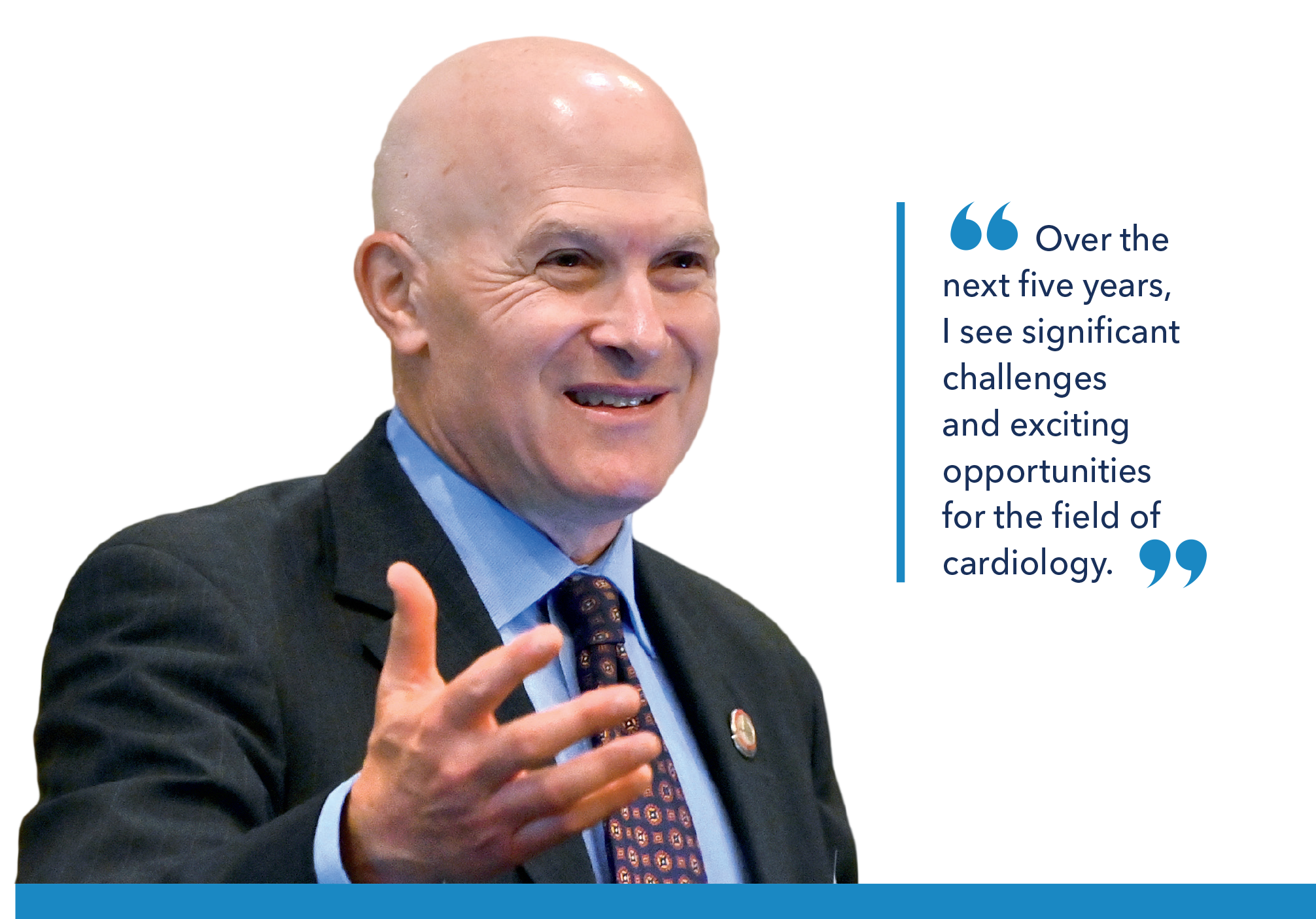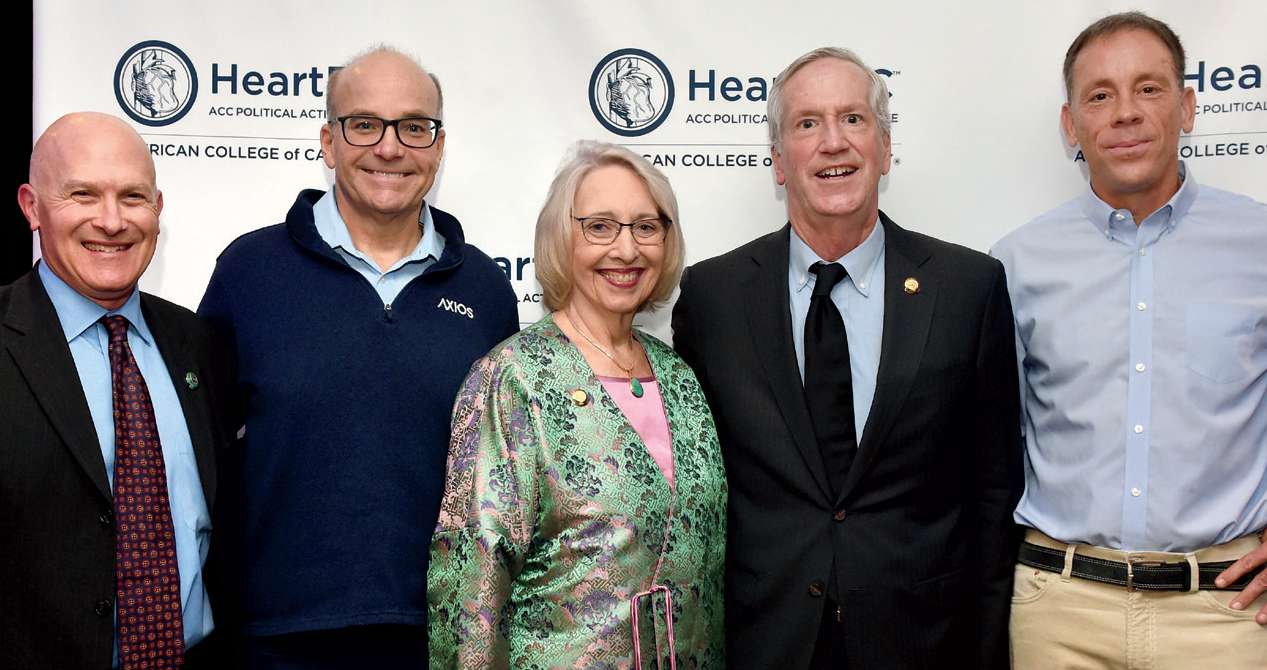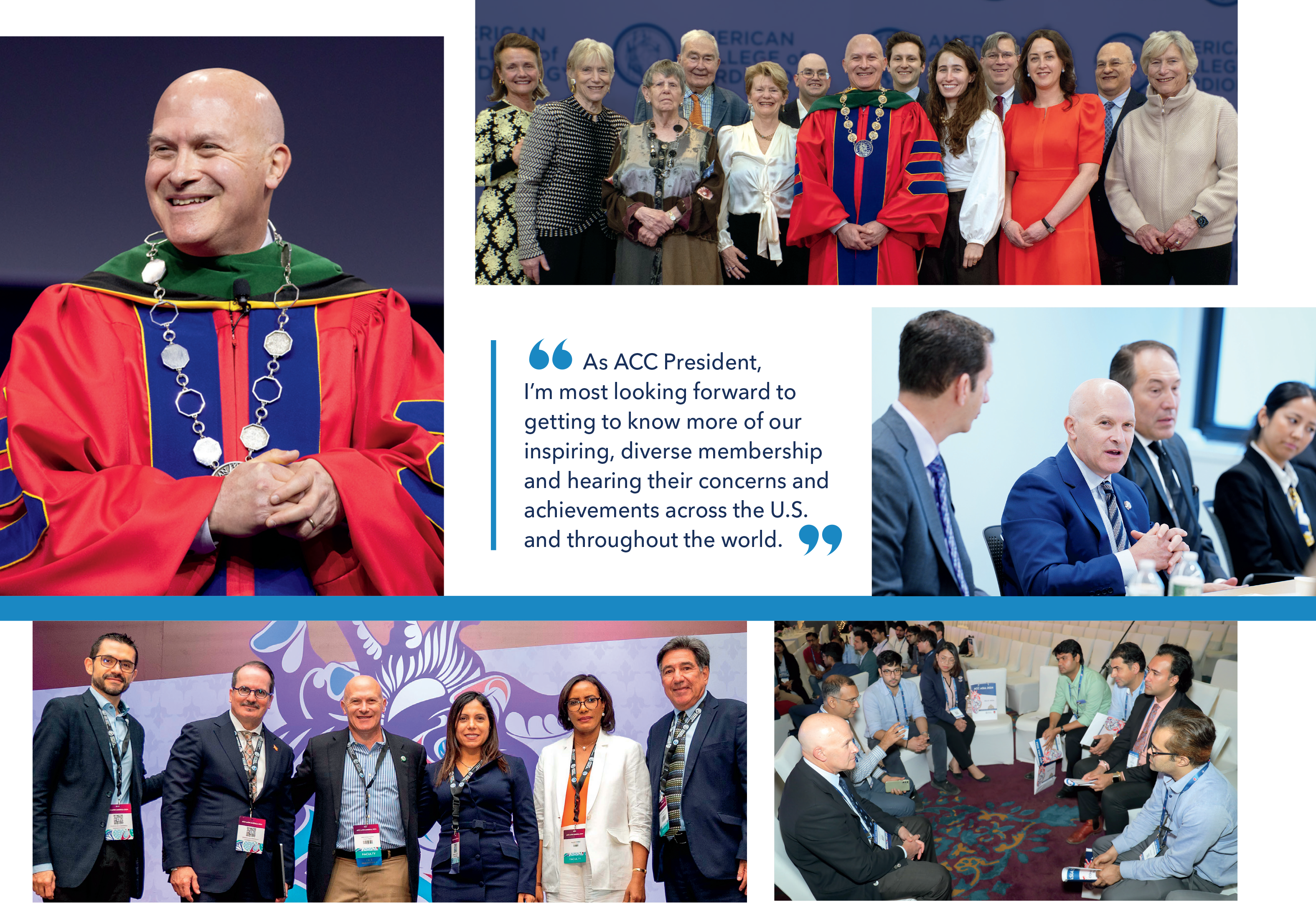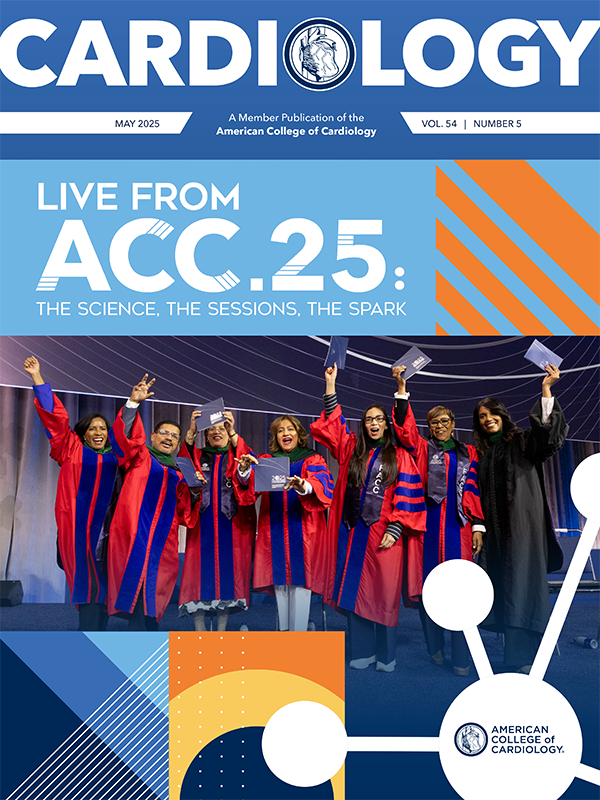Get to Know Your Leaders | Leading With Purpose: Meet Christopher M. Kramer, MD, FACC

Ask ACC President Christopher M. Kramer, MD, FACC, what achievement he is most proud of, and he'll say: "Raising two terrific sons with my wife. They are each contributing to their communities and the world in very different ways."
Kramer officially assumed the role of ACC President with the ceremonial passing of the presidential chain from Cathleen Biga, MSN, MACC, during ACC's annual Convocation at ACC.25 in Chicago.
After receiving his medical degree from the University of California, San Francisco School of Medicine, Kramer completed his residency and chief residency in internal medicine, and fellowship in cardiology at the Hospital of the University of Pennsylvania. His first faculty appointment was at Allegheny General Hospital, then MCP/Hahnemann University School of Medicine, where he directed the cardiology fellowship before moving to the University of Virginia School of Medicine (UVA) where he became chief of the Cardiovascular Division in 2019. Kramer's principal research interest has been the application of cardiovascular magnetic resonance (CMR) imaging to the cardiovascular system in translational and clinical studies.
His dedication to the College is reflected in his various leadership roles, including vice president, treasurer and chair of ACC's Imaging Council. Kramer was also an associate editor for imaging at JACC and Executive Editor of JACC: Cardiovascular Imaging. In 2021, Kramer was named a Distinguished Mentor by the ACC, which he has described as 'an incredible honor.'
Ahead of Kramer taking the helm of the ACC as its 74th President at ACC.25, Cardiology spoke with him about his leadership style, his excitement for the role, and his advice for future leaders, as well as his views on the most significant opportunities and pressing challenges for the College and the future of cardiology.
What inspired you to pursue a career in cardiology? How did you find your path in Imaging?
My journey into cardiology began when I was a sophomore and won a high school summer scholarship for the Washington, D.C. area that was supported by the American Heart Association. I had attended a series of inspirational lectures by Georgetown faculty, including W. Proctor Harvey, MD, who spoke about cardiac auscultation and medications. Ironically, despite my interest in cardiology, I was placed in a hematology lab at Georgetown for the summer because they had run out of cardiology labs in the D.C. area, and I was younger than the other scholarship winners. That experience set me on my path.
By my first year of medical school, my love for cardiac physiology and pathophysiology was confirmed. My interest in imaging began while serving as Medicine Chief Resident at the University of Pennsylvania from 1989 through 1990. I invited Nathaniel Reichek, MD, FACC, then head of the Penn echo lab, to speak at the Medical Grand Rounds series, which I helped run. He spoke about the nascent field of CMR imaging, and as I listened, all I could think was: "I want to do that." Less than two years later, as a second-year cardiology fellow at Penn, I got my start in CMR research. The rest is history.

What are some of the most significant milestones in your professional career so far?
One at the top of my list is being named an ACC Distinguished Mentor. This was an incredible honor. I've always believed my greatest contribution has been training a cadre of cardiology fellows and others in cardiovascular imaging, both clinically and in research. Also high on my list is receiving the Gold Medal from the Society for Cardiovascular Magnetic Resonance in 2015, because it reinforced the impact of my contributions to the field of CMR over my career.
Leading the UVA Cardiovascular Division, which includes a terrific group of soon to be more than 50 clinical cardiovascular faculty members as well as more than 20 fellows each year, has been a rewarding experience. Since becoming chief in 2019, I've recruited nearly 30 new faculty members.
Another significant achievement has been securing funding from the National Heart, Lung, and Blood Institute as co-principal investigator of the Hypertrophic Cardiomyopathy (HCM) Registry, alongside Stefan Neubauer, MD, FACC, of the University of Oxford. This comprehensive clinical, imaging, genetics and biomarker study, which includes 2,750 patients from 44 sites across six countries, has been a tour de force. It was nearly derailed by COVID, but we continued and will be reporting out a model to predict sudden cardiac death and heart failure in HCM later this year.
Finally, participating as the CMR Core Lab for the SUMMIT trial of tirzepatide in obesity-related heart failure with preserved ejection fraction led to a recent co-authored paper in The New England Journal of Medicine and a first-authored paper in JACC.
Any specific mentors you want to call out?
Yes, several. George A. Beller, MD, MACC, has been my principal ACC mentor. He was a previous chief of the UVA Cardiovascular Division and past president of the ACC. Beller is a wonderful role model and has helped guide me on my ACC journey, as has past ACC president and current UVA faculty member C. Michael Valentine MD, MACC. The late Dr. Reichek, was a fellowship and junior faculty mentor of mine. He got me started in CMR and taught me clinical and research principles that have guided my career. I'd also like to recognize Joao Lima, MD, FACC, who was a University of Pennsylvania faculty member for two years during my fellowship, for instilling in me a passion for research.

What qualities do you anticipate relying on the most during your time as the ACC President?
I'm a good listener and I'll rely on that skill to understand members' needs and concerns in the coming year. The College is a complex and dynamic place with a lot of moving parts. Keeping track of all that is going on is a challenge, so I'll also rely on my organizational skills. There will be a number of challenges in the coming year, given the state of U.S. politics. We will need to remain true to our principles at ACC.
How would you describe your leadership style?
I lead with a quiet, consensus-building approach, while maintaining a light, humorous touch.
What are you most looking forward to as ACC President?
As ACC President, I'm most looking forward to getting to know more of our inspiring, diverse membership and hearing their concerns and achievements across the U.S. and throughout the world. I'm also looking forward to working with an extremely talented and knowledgeable Board of Trustees, as well as the outstanding ACC staff.
What advice would you offer ACC members who are interested in leadership roles?
For anyone interested in an ACC leadership role, I would tell them to volunteer early and often. Join committees, starting at the State Chapter level and work your way up to the national level. There are so many different opportunities to get involved in the College.
Where do you see the field of cardiology in the next 5 years? Challenges/opportunities?
Over the next five years, I see significant challenges and exciting opportunities for the field of cardiology. One of the challenges will be workforce issues, particularly the increasing struggles with electronic medical records and the excessive time spent charting outside of usual work hours.
Additionally, I expect ongoing barriers to the ACC's efforts in the health equity and diversity and inclusion space, which will require continued dedication and advocacy.
Along with those challenges, there will be many opportunities, including innovation, especially AI-driven solutions. These approaches can help address some of these workforce challenges, and much of this progress can come through our Innovation Committee and Lifelong Learning Committee.
There is also a major opportunity for the College to take the lead in the health equity space, especially as other organizations may pull back due to governmental pressures.
Outside of your professional life, what do you do for fun?
Sports, both participating and watching. I was a coxswain on a championship crew in college, played ice hockey until I was 40, and then switched to racquet sports until orthopedic issues sidelined me. Presently, I'm an avid Pelotoner and stay active by hiking, swimming, biking and golfing. When I'm in town, I attend UVA sporting events whenever I can.
Another passion is live music, largely thanks to my wife, Cathy, who is a true music aficionado. Charlottesville is a fantastic town for live music; Dave Matthews is from here. I try to catch concerts whenever possible, from rock to chamber music, although I only manage to attend a fraction of what Cathy does!
Keywords: Cardiology Magazine, ACC Publications, ACC25, ACC Annual Scientific Session, Leadership, Mentors
